选择性必修 二 Unit1 Science and scientists -Discovering useful structures (72张PPT)
文档属性
| 名称 | 选择性必修 二 Unit1 Science and scientists -Discovering useful structures (72张PPT) | 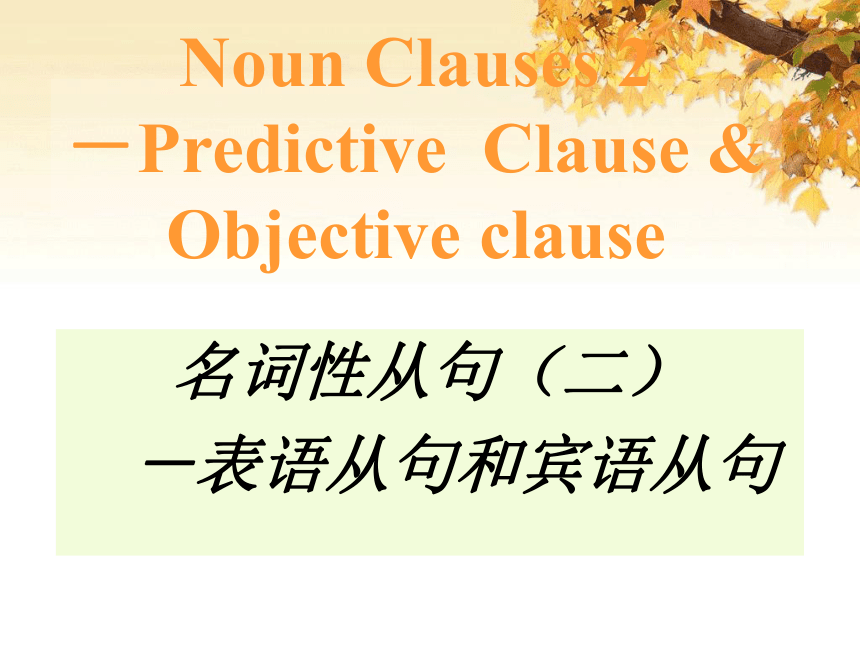 | |
| 格式 | zip | ||
| 文件大小 | 1.3MB | ||
| 资源类型 | 试卷 | ||
| 版本资源 | 人教版(2019) | ||
| 科目 | 英语 | ||
| 更新时间 | 2021-12-27 14:05:53 | ||
图片预览

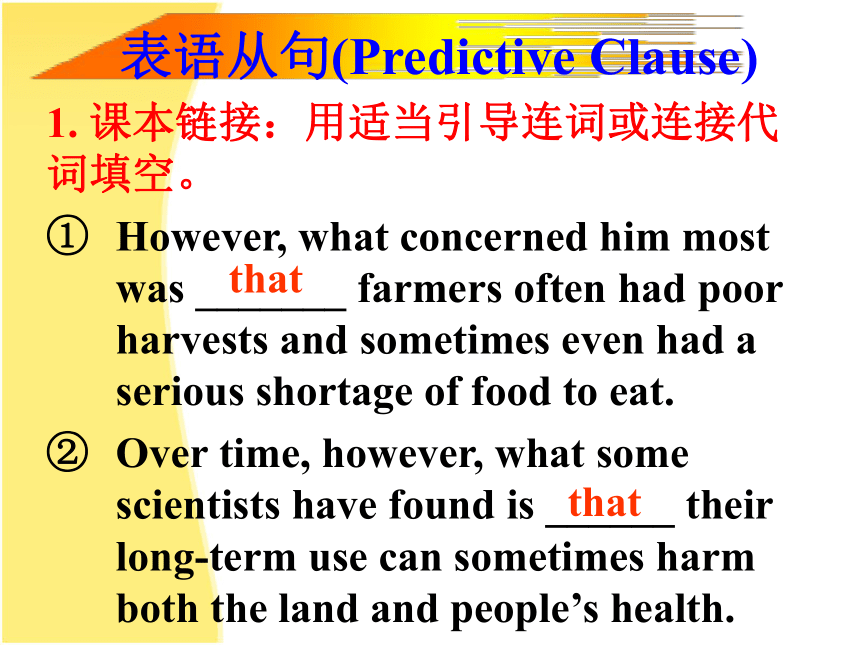
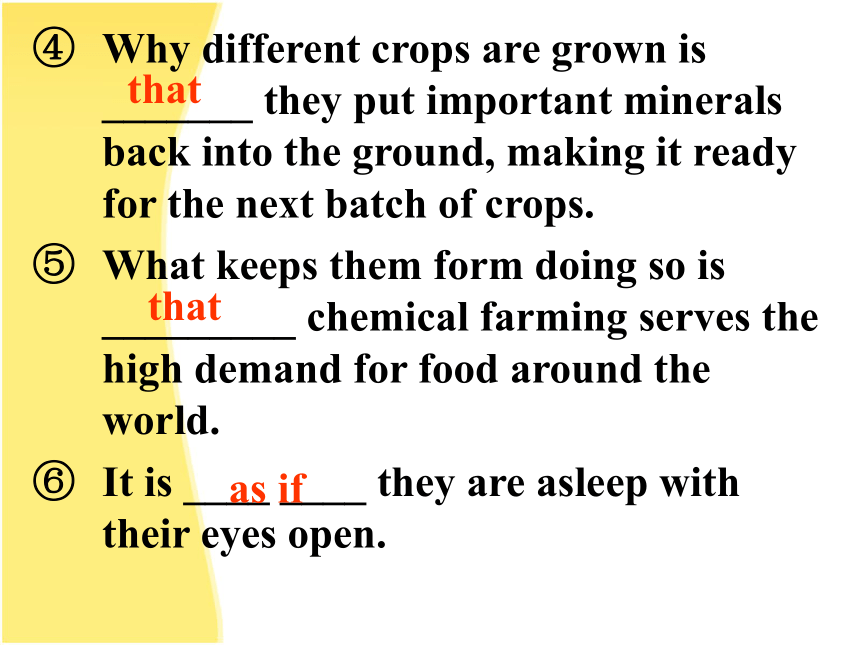
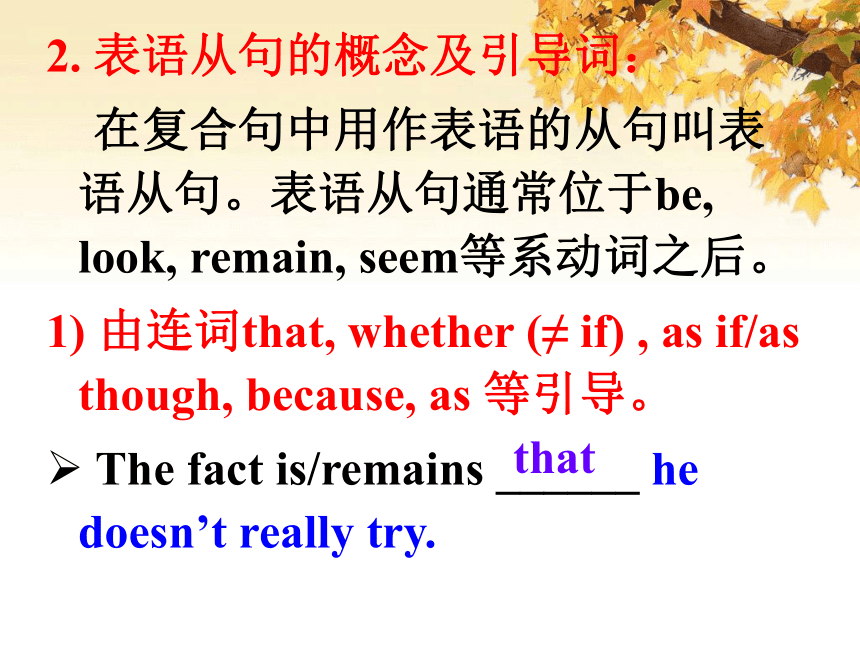
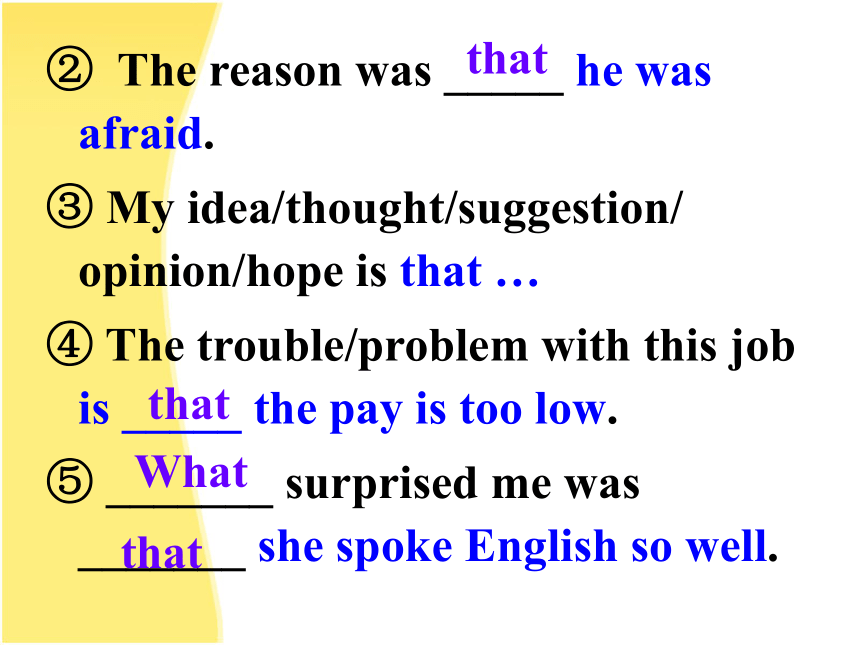
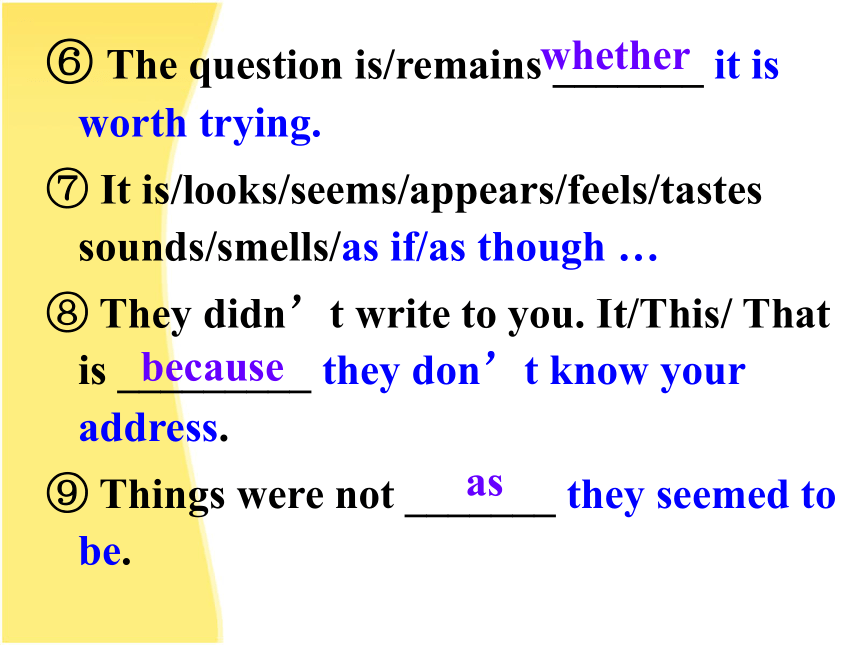
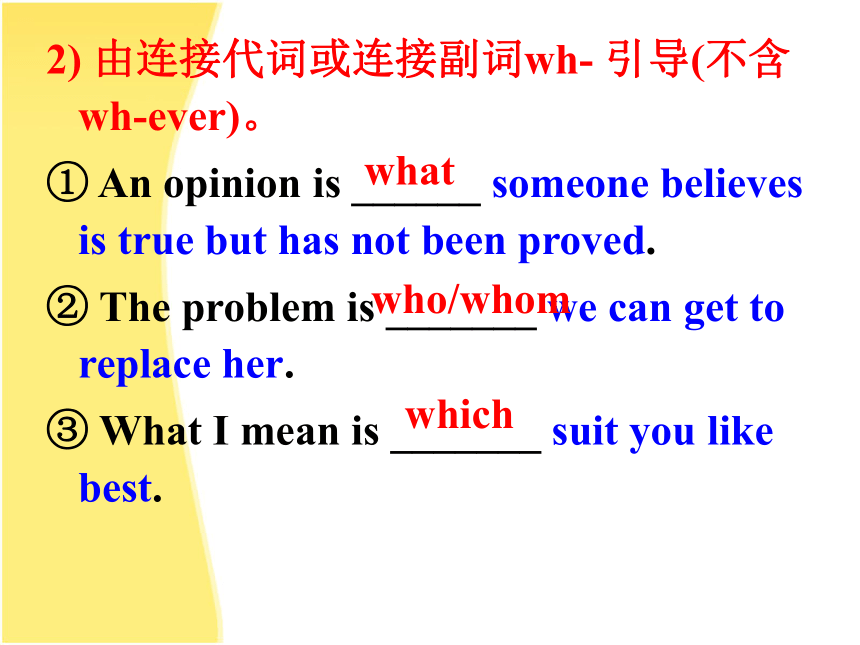
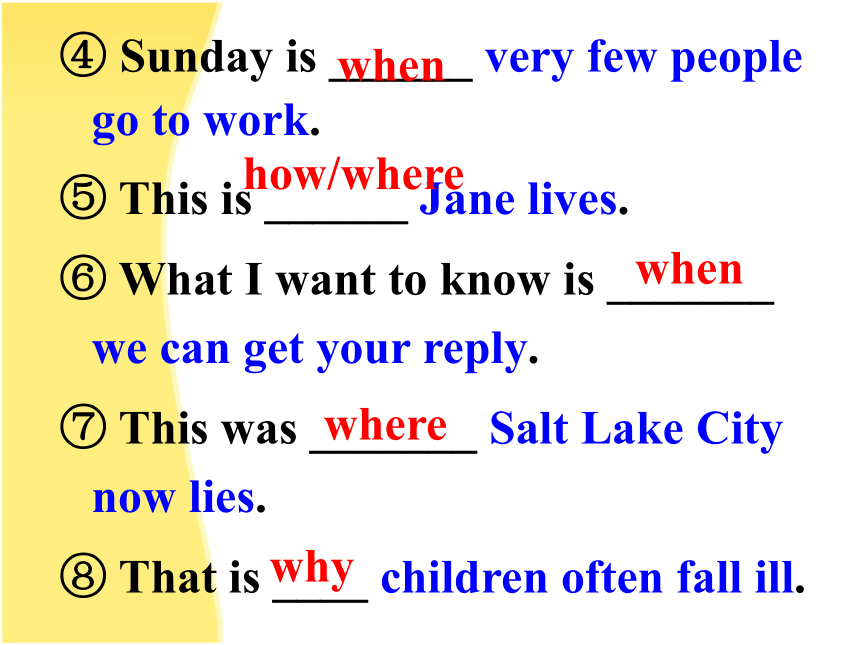
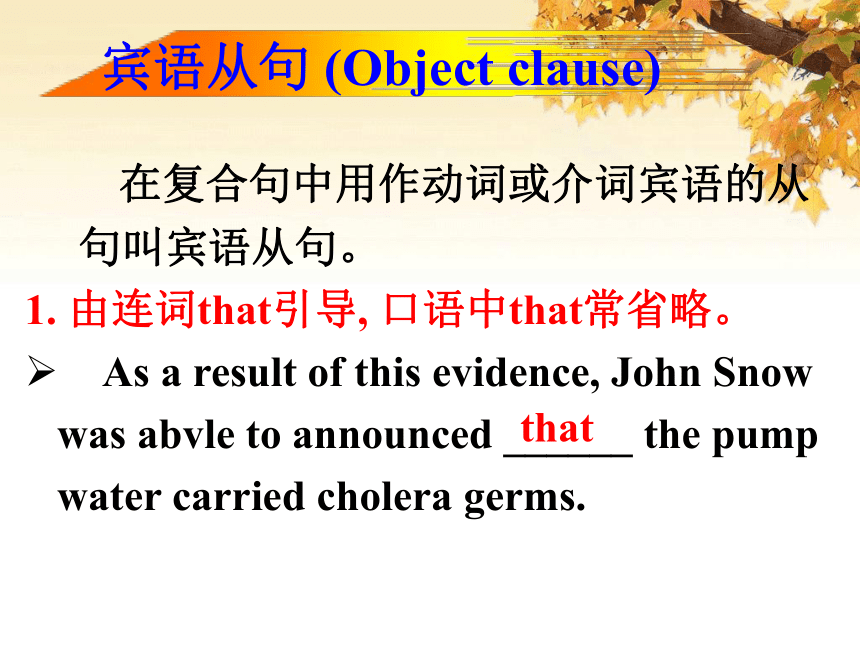
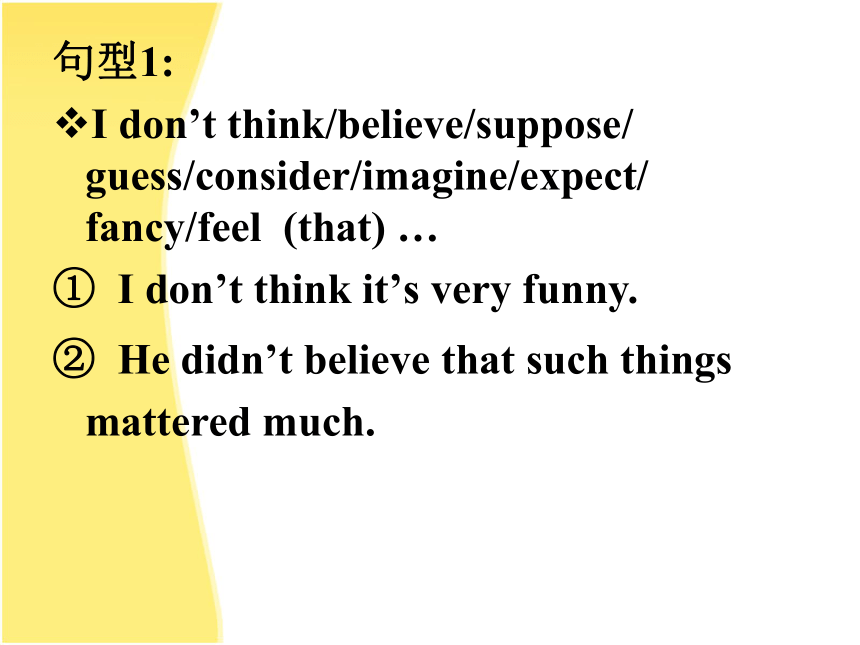
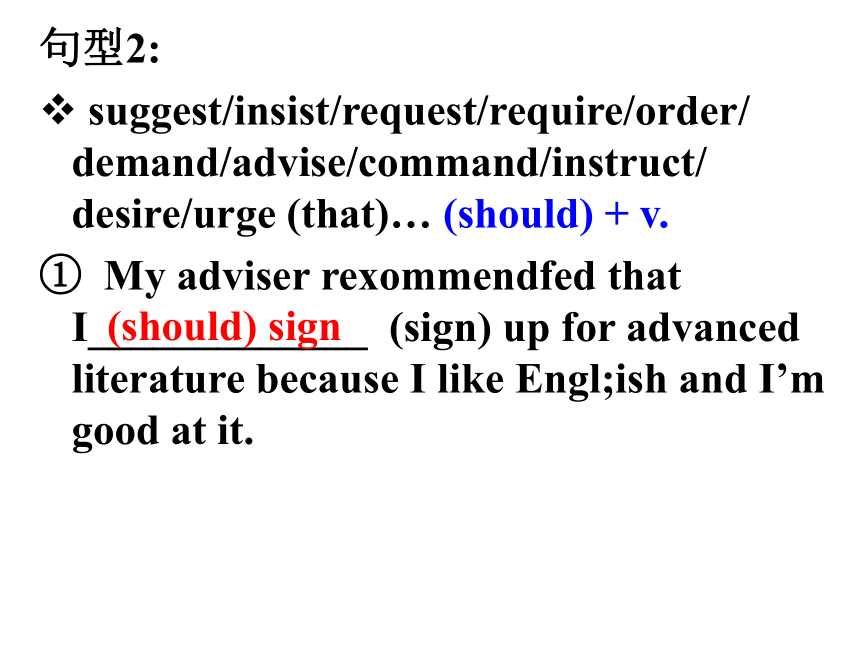
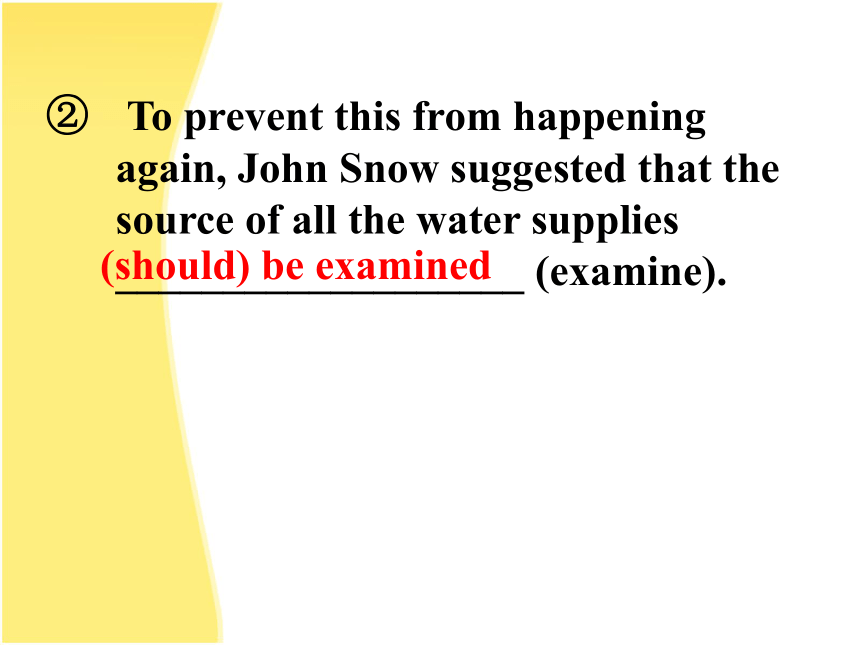
文档简介
(共72张PPT)
Noun Clauses 2
-Predictive Clause & Objective clause
名词性从句(二)
-表语从句和宾语从句
1. 课本链接:用适当引导连词或连接代词填空。
However, what concerned him most was _______ farmers often had poor harvests and sometimes even had a serious shortage of food to eat.
Over time, however, what some scientists have found is ______ their long-term use can sometimes harm both the land and people’s health.
表语从句(Predictive Clause)
that
that
Why different crops are grown is _______ they put important minerals back into the ground, making it ready for the next batch of crops.
What keeps them form doing so is _________ chemical farming serves the high demand for food around the world.
It is ____ ____ they are asleep with their eyes open.
that
that
as if
2. 表语从句的概念及引导词:
在复合句中用作表语的从句叫表语从句。表语从句通常位于be, look, remain, seem等系动词之后。
1) 由连词that, whether (≠ if) , as if/as though, because, as 等引导。
The fact is/remains ______ he doesn’t really try.
that
The reason was _____ he was afraid.
My idea/thought/suggestion/ opinion/hope is that …
The trouble/problem with this job is _____ the pay is too low.
_______ surprised me was _______ she spoke English so well.
that
that
What
that
The question is/remains _______ it is worth trying.
It is/looks/seems/appears/feels/tastes sounds/smells/as if/as though …
They didn’t write to you. It/This/ That is _________ they don’t know your address.
Things were not _______ they seemed to be.
whether
because
as
2) 由连接代词或连接副词wh- 引导(不含wh-ever)。
An opinion is ______ someone believes is true but has not been proved.
The problem is _______ we can get to replace her.
What I mean is _______ suit you like best.
what
who/whom
which
Sunday is ______ very few people go to work.
This is ______ Jane lives.
What I want to know is _______ we can get your reply.
This was _______ Salt Lake City now lies.
That is ____ children often fall ill.
when
how/where
when
where
why
宾语从句 (Object clause)
在复合句中用作动词或介词宾语的从句叫宾语从句。
1. 由连词that引导, 口语中that常省略。
As a result of this evidence, John Snow was abvle to announced ______ the pump water carried cholera germs.
that
句型1:
I don’t think/believe/suppose/ guess/consider/imagine/expect/ fancy/feel (that) …
I don’t think it’s very funny.
He didn’t believe that such things mattered much.
句型2:
suggest/insist/request/require/order/ demand/advise/command/instruct/ desire/urge (that)… (should) + v.
My adviser rexommendfed that I_____________ (sign) up for advanced literature because I like Engl;ish and I’m good at it.
(should) sign
To prevent this from happening again, John Snow suggested that the source of all the water supplies ___________________ (examine).
(should) be examined
句型3:
think/consider/feel/find/make it +adj./n. + that/wh- …
I think it important/necessary ________ young people master two languages.
He has made it clear ________ he won’t agree to the plan. (说明)
that
that
The rules make it quite clear _________ should be done in such a situation.
We all consider it a pity ______ he was not able to join us.
He hasn’t made it known/public _______ he is to be married. (宣布)
that
what
when
句型4
be (not) afraid/sorry/sure that/ wh-…
I’m afraid I don’t quite follow you.
No one can be sure _______ man will look like in a million years.
2. 由连词whether/if (是否)引导。
I did not know whether/if I could survive until morning.
what
I wonder whether/if you’d mind us asking a few questions.
但下列情况下只用whether:
Please tell me whether or not you agree. (or not 紧跟 whether之后≠if)
=Please tell me whether/if you agree (or not).
I was worried about whether I would become out of work. (介词之后≠if )
Whether (or not) he will accept your offer I don’t know. (宾语从句置于句首≠if)
(此外引导主从、表从、同位语从句只用whether, 不用if。)
3. 由连接代词或副词wh- (含whatever,whichever,whoever, whomever)引导。
First, I had to think very carefully about ________ courses I wanted to take.
So how can I rally know _______ makes each student tick
Studying hard isn’t always fun, but I’ll be well prepared for university or _______ else comes in the future.
which
whatever
what
People began to wonder ______ long the disaster would last.
We haven’t decided _______ we’ll set off for home.
Nobody knows for sure _______ and ______ dinosaurs disappeared from the earth in such a short time.
The children are allowed to do __________ they like.
Choose ________ of them you like best.
why
when
how
whatever
how
whichever
We’ll give you ___________ help you need.
Take __________ seat you like.
You can give the ticket to _______ wants it.
You can give the ticket to __________ you like.
whichever
whatever
whoever
whoever/whomever
注意: 介词之后多用wh- 引导的宾语从句,that从句较少见:
I’m interested not in _________ we shall go for a picnic but in _______ and ________ we shall have it.
We can learn a lot about _______ people are thinking by watching their body language.
whether
when
where
what
Over time, much of __________ was nearby died.
But:
I knows nothing about him except _______ he lives next door.
whatever
that
名词性从句练习(1)
(表语从句与宾语从句)
1. I lived in _______ you call “Ancient Greece” and I used to write about the Olympic Games more than 2,000 years ago.
Others write about their travels in ________ is called a travel journal.
That’s ______ we looked like.
what
I. Fill in the blanks
what
what
4. In 1492, Columbus arrived in _______ is now called America/ we now call America.
5. A modern city has been set up in ______was a wasteland ten years ago.
6. The hotel in ________ we stayed was both cheap and comfortable.
what
what
which
7. In some countries, ______ is called “equality” does not really mean rights for all people.
8.This is ______ they call Salt Lake city.
9. That is ________ they are called the Winter Olympics.
what
what
why
10. Dr Yuan Longping grows _______ is called supper hibrid rice (超级杂交水稻).
11. An attitude is _______ a person thinks about something.
13. _______ life will continue on earth for millions of years to come will depend on _______ the problem will be solved.
what
what
whether
whether
1. Steve says those are ________ his friends want.
A. that B. what
C. which D. whatever
2. Go and get your coat. It’s ___ you left it.
A. there B. there where
C. where D. where there
II. Make the best choice:
B
C
3. The question is _______ it is worth doing.
A. why B. when
C. what D. whether
4. Now is ________ I need you.
A. who B. when
C. what D. why
D
B
5. ______ the old man’s sons wanted to know was _____ the gold had been hidden.
A. That; when B. What; where
C. What; that D. Which; whether
6. China is no longer ____it used to be.
A. where B. which
C. what D. who
B
C
7. I remember _____ this used to be a quiet village.
A. when B. how
C. where D. what
8. It is generally considered unwise to give a child ______ he or she wants.
A. whatever B. whichever
C. what D. whenever
A
A
9. —I drove to Zhuhai for the air show last week.
—Is that _______ you had a few days off
A. why B. what C. when D. where
10. Sarah hopes to become a friend of _____ shares her interests.
A. anyone B. whomever
C. whoever D. no matter who
A
C
11. It was a matter of _____ would take the position.
A. who B. whom
C. whoever D. whomever
12. _____ worries me is _____ we’re going to pay for all this.
A. It, that B. That, how
C. What, how D. Why, whether
A
C
13. He pointed to _______ looked like a tree.
A. that B. what
C. which D. where
14. His income is double ______ it was five years ago.
A. that B. which C. as D. what
B
D
15. I strongly believe ______ he said at the meeting was right.
A. that B. which
C. that what D. what that
16. John was among the first to settle in ____is now New England.
A. which B. where
C. that D. what
C
D
17. He asked me _______ of the plan put forward at the meeting.
what did I think
what I thought
how did I think
how I thought
B
18. The poor young man is ready to accept _______ help he can get.
A. whichever B. however
C. whatever D. whenever
19. All the books are here. You may borrow ______ you like.
A. whatever B. which
C. whichever D. what
C
C
20. I don’t know if she ______, but if she ______ I will let you know.
A. comes, comes
B. will come, will come
C. comes, will come
D. will come, comes
D
21.You are saying that everyone should be equal, and this is ______ I disagree.
A. why B. where C. what D. how
22. They make _____ a rule that whoever breaks the law will be punished.
A. it B. that C. this D. what
B
A
23. You should wear _____ dress suits you best.
A. which B. whichever
C. any D. whatever
24. I’m willing to pay ______ price you ask.
A. what B. which
C. whichever D. whatever
D
B
25. Perseverance is a kind of quality—and that’s ______it takes to do anything well.
A. what B. that
C. which D. why
A
26.______ seems strange to us is ______ the troublesome boy is getting along well with all his teachers.
A. It; that B. What; how
C. It; how D. What; that
D
27.The shopkeeper did not want to sell for___ he thought was not enough.
A. where
B. how
C. what
D. which
C
28. Mary wrote an article on___ the team had failed to win the game.
A. why
B. what
C. who
D. that
A
29.After Yang Liwei succeeded in circling the earth, ___our astronauts desire to do is walk in space.
A. where
B. what
C. that
D. how
B
30. We wrote a letter of thanks to _________ had helped us.
A. who B. whoever
C. whomever D. anyone
B
31. You can’t imagine ____ when they received these nice Christmas presents. A. how excited they were B. how they were excited C. how were they excited D. they were how excited
A
HOST: In this hour, we’ll talk about _______ our life will be like in the future. Let’s warmly welcome Dr Smart, a professor from Future University! He’ll tell us ________ he thinks about our future. Professor Smart, your many predictions made 30 years ago
练一练:语法填空 (一)
about our life in the future have mostly come true. People want to know more. There are many high school students here who are curious to know ______ new predictions you will make about the future.
DR SMART: Society is developing fast and there will be many new things
that will make our lives much more convenient, but at the same time many new problems will threaten the quality of life. ______’s important is not _______ my predictions come true or not, but __________ they help us make better decisions about our future.
_________ we live today will influence the future.
HOST: In this hour, we’ll talk about _______ our life will be like in the future. Let’s warmly welcome Dr Smart, a professor from Future University! He’ll tell us ________ he thinks about our future. Professor Smart, your many predictions made 30 years ago
what
what
练一练:语法填空 (一)
about our life in the future have mostly come true. People want to know more. There are many high school students here who are curious to know ______ new predictions you will make about the future.
DR SMART: Society is developing fast and there will be many new things
what
that will make our lives much more convenient, but at the same time many new problems will threaten the quality of life. ______’s important is not _______ my predictions come true or not, but __________ they help us make better decisions about our future.
What
whether
whether
_________ we live today will influence the future.
How
Danger is not ______ we expect. But the truth is _______ it often comes suddenly and unexpectedly. How can we get out of danger There are many answers to this question. The key is _______ we can face danger bravely.
练一练:语法填空 (二)
_______ you must remember is ______ you must believe in yourself. Just remember _______ you can defeat danger. Tell youreslf _______ you can turn into a superworman or a superman ______ you are in danger. This is ______ I am going to tell you the stories of Mrs Weldon and Dr. Watson.
Mrs. Weldon reported _______
her body was nearly run over by a car ______ she was trying to save her baby. Mrs. Weldon weighs only fifty kilograms. She looks as if she was very weak, but she said she lifted the car to save her baby. Dr. Watson, a zoologist, wrote _______ he jumped nearly three meters high into the air to take hold of the lowest branch of a tree ______some wolves
ran after him. Perhaps you are wondering _______ you can do such things like them. The chances are _______ you can!
Danger is not ______ we expect. But the truth is _______ it often comes suddenly and unexpectedly. How can we get out of danger There are many answers to this question. The key is _______ we can face danger bravely.
what
that
whether
练一练:语法填空 (二)
_______ you must remember is ______ you must believe in yourself. Just remember _______ you can defeat danger. Tell youreslf _______ you can turn into a superworman or a superman ______ you are in danger. This is ______ I am going to tell you the stories of Mrs Weldon and Dr. Watson.
Mrs. Weldon reported _______
that
What
that
why
when
that
that
her body was nearly run over by a car ______ she was trying to save her baby. Mrs. Weldon weighs only fifty kilograms. She looks as if she was very weak, but she said she lifted the car to save her baby. Dr. Watson, a zoologist, wrote _______ he jumped nearly three meters high into the air to take hold of the lowest branch of a tree ______some wolves
when
that
when
ran after him. Perhaps you are wondering ___________ you can do such things like them. The chances are _______ you can!
whether/if
that
Mothers want to give (1) ______ their children need, such as love and attention. Do you know (2) _______ they want to show their love They stay with their children as long as possible, except (3) _______ they have to work.
Mothers who work feel (4) ____
练一练:语法填空 (三)
they are not giving enough attention to their kids. They think (5) _______ their children want to spend more time with them.
According to Helen, working mothers feel sorry for (6) _______ they cannot do for their children. But no one had ever asked children (7) _______ they thought. So she asked over 1,000 kids of working
mothers to find out (8) ________ they wanted. She asked them (9) _______ they wanted their moms to stay at home. Surpringly, only 10% of the children said (10) _______ they wanted more time with their mothers and (11) _______ they wanted their parents to pay more attention to them. They said (12) _________ their parents were
often busy. When she asked them (13) _______ they needed most, most of them said (14) ______ they wanted to feel important and loved.
Mothers want to give (1) ______ their children need, such as love and attention. Do you know (2) _______ they want to show their love They stay with their children as long as possible, except (3) _______ they have to work.
Mothers who work feel (4) ____
练一练:语法填空 (三)
whatever
how
when
that
they are not giving enough attention to their kids. They think (5) _______ their children want to spend more time with them.
According to Helen, working mothers feel sorry for (6) _______ they cannot do for their children. But no one had ever asked children (7) _______ they thought. So she asked over 1,000 kids of working
that
what
what
mothers to find out (8) ________ they wanted. She asked them (9) _______ they wanted their moms to stay at home. Surpringly, only 10% of the children said (10) _______ they wanted more time with their mothers and (11) _______ they wanted their parents to pay more attention to them. They said (12) _________ their parents were
what
whether/if
that
that
that
often busy. When she asked them (13) _______ they needed most, most of them said (14) ______ they wanted to feel important and loved.
what
that
The End
Noun Clauses 2
-Predictive Clause & Objective clause
名词性从句(二)
-表语从句和宾语从句
1. 课本链接:用适当引导连词或连接代词填空。
However, what concerned him most was _______ farmers often had poor harvests and sometimes even had a serious shortage of food to eat.
Over time, however, what some scientists have found is ______ their long-term use can sometimes harm both the land and people’s health.
表语从句(Predictive Clause)
that
that
Why different crops are grown is _______ they put important minerals back into the ground, making it ready for the next batch of crops.
What keeps them form doing so is _________ chemical farming serves the high demand for food around the world.
It is ____ ____ they are asleep with their eyes open.
that
that
as if
2. 表语从句的概念及引导词:
在复合句中用作表语的从句叫表语从句。表语从句通常位于be, look, remain, seem等系动词之后。
1) 由连词that, whether (≠ if) , as if/as though, because, as 等引导。
The fact is/remains ______ he doesn’t really try.
that
The reason was _____ he was afraid.
My idea/thought/suggestion/ opinion/hope is that …
The trouble/problem with this job is _____ the pay is too low.
_______ surprised me was _______ she spoke English so well.
that
that
What
that
The question is/remains _______ it is worth trying.
It is/looks/seems/appears/feels/tastes sounds/smells/as if/as though …
They didn’t write to you. It/This/ That is _________ they don’t know your address.
Things were not _______ they seemed to be.
whether
because
as
2) 由连接代词或连接副词wh- 引导(不含wh-ever)。
An opinion is ______ someone believes is true but has not been proved.
The problem is _______ we can get to replace her.
What I mean is _______ suit you like best.
what
who/whom
which
Sunday is ______ very few people go to work.
This is ______ Jane lives.
What I want to know is _______ we can get your reply.
This was _______ Salt Lake City now lies.
That is ____ children often fall ill.
when
how/where
when
where
why
宾语从句 (Object clause)
在复合句中用作动词或介词宾语的从句叫宾语从句。
1. 由连词that引导, 口语中that常省略。
As a result of this evidence, John Snow was abvle to announced ______ the pump water carried cholera germs.
that
句型1:
I don’t think/believe/suppose/ guess/consider/imagine/expect/ fancy/feel (that) …
I don’t think it’s very funny.
He didn’t believe that such things mattered much.
句型2:
suggest/insist/request/require/order/ demand/advise/command/instruct/ desire/urge (that)… (should) + v.
My adviser rexommendfed that I_____________ (sign) up for advanced literature because I like Engl;ish and I’m good at it.
(should) sign
To prevent this from happening again, John Snow suggested that the source of all the water supplies ___________________ (examine).
(should) be examined
句型3:
think/consider/feel/find/make it +adj./n. + that/wh- …
I think it important/necessary ________ young people master two languages.
He has made it clear ________ he won’t agree to the plan. (说明)
that
that
The rules make it quite clear _________ should be done in such a situation.
We all consider it a pity ______ he was not able to join us.
He hasn’t made it known/public _______ he is to be married. (宣布)
that
what
when
句型4
be (not) afraid/sorry/sure that/ wh-…
I’m afraid I don’t quite follow you.
No one can be sure _______ man will look like in a million years.
2. 由连词whether/if (是否)引导。
I did not know whether/if I could survive until morning.
what
I wonder whether/if you’d mind us asking a few questions.
但下列情况下只用whether:
Please tell me whether or not you agree. (or not 紧跟 whether之后≠if)
=Please tell me whether/if you agree (or not).
I was worried about whether I would become out of work. (介词之后≠if )
Whether (or not) he will accept your offer I don’t know. (宾语从句置于句首≠if)
(此外引导主从、表从、同位语从句只用whether, 不用if。)
3. 由连接代词或副词wh- (含whatever,whichever,whoever, whomever)引导。
First, I had to think very carefully about ________ courses I wanted to take.
So how can I rally know _______ makes each student tick
Studying hard isn’t always fun, but I’ll be well prepared for university or _______ else comes in the future.
which
whatever
what
People began to wonder ______ long the disaster would last.
We haven’t decided _______ we’ll set off for home.
Nobody knows for sure _______ and ______ dinosaurs disappeared from the earth in such a short time.
The children are allowed to do __________ they like.
Choose ________ of them you like best.
why
when
how
whatever
how
whichever
We’ll give you ___________ help you need.
Take __________ seat you like.
You can give the ticket to _______ wants it.
You can give the ticket to __________ you like.
whichever
whatever
whoever
whoever/whomever
注意: 介词之后多用wh- 引导的宾语从句,that从句较少见:
I’m interested not in _________ we shall go for a picnic but in _______ and ________ we shall have it.
We can learn a lot about _______ people are thinking by watching their body language.
whether
when
where
what
Over time, much of __________ was nearby died.
But:
I knows nothing about him except _______ he lives next door.
whatever
that
名词性从句练习(1)
(表语从句与宾语从句)
1. I lived in _______ you call “Ancient Greece” and I used to write about the Olympic Games more than 2,000 years ago.
Others write about their travels in ________ is called a travel journal.
That’s ______ we looked like.
what
I. Fill in the blanks
what
what
4. In 1492, Columbus arrived in _______ is now called America/ we now call America.
5. A modern city has been set up in ______was a wasteland ten years ago.
6. The hotel in ________ we stayed was both cheap and comfortable.
what
what
which
7. In some countries, ______ is called “equality” does not really mean rights for all people.
8.This is ______ they call Salt Lake city.
9. That is ________ they are called the Winter Olympics.
what
what
why
10. Dr Yuan Longping grows _______ is called supper hibrid rice (超级杂交水稻).
11. An attitude is _______ a person thinks about something.
13. _______ life will continue on earth for millions of years to come will depend on _______ the problem will be solved.
what
what
whether
whether
1. Steve says those are ________ his friends want.
A. that B. what
C. which D. whatever
2. Go and get your coat. It’s ___ you left it.
A. there B. there where
C. where D. where there
II. Make the best choice:
B
C
3. The question is _______ it is worth doing.
A. why B. when
C. what D. whether
4. Now is ________ I need you.
A. who B. when
C. what D. why
D
B
5. ______ the old man’s sons wanted to know was _____ the gold had been hidden.
A. That; when B. What; where
C. What; that D. Which; whether
6. China is no longer ____it used to be.
A. where B. which
C. what D. who
B
C
7. I remember _____ this used to be a quiet village.
A. when B. how
C. where D. what
8. It is generally considered unwise to give a child ______ he or she wants.
A. whatever B. whichever
C. what D. whenever
A
A
9. —I drove to Zhuhai for the air show last week.
—Is that _______ you had a few days off
A. why B. what C. when D. where
10. Sarah hopes to become a friend of _____ shares her interests.
A. anyone B. whomever
C. whoever D. no matter who
A
C
11. It was a matter of _____ would take the position.
A. who B. whom
C. whoever D. whomever
12. _____ worries me is _____ we’re going to pay for all this.
A. It, that B. That, how
C. What, how D. Why, whether
A
C
13. He pointed to _______ looked like a tree.
A. that B. what
C. which D. where
14. His income is double ______ it was five years ago.
A. that B. which C. as D. what
B
D
15. I strongly believe ______ he said at the meeting was right.
A. that B. which
C. that what D. what that
16. John was among the first to settle in ____is now New England.
A. which B. where
C. that D. what
C
D
17. He asked me _______ of the plan put forward at the meeting.
what did I think
what I thought
how did I think
how I thought
B
18. The poor young man is ready to accept _______ help he can get.
A. whichever B. however
C. whatever D. whenever
19. All the books are here. You may borrow ______ you like.
A. whatever B. which
C. whichever D. what
C
C
20. I don’t know if she ______, but if she ______ I will let you know.
A. comes, comes
B. will come, will come
C. comes, will come
D. will come, comes
D
21.You are saying that everyone should be equal, and this is ______ I disagree.
A. why B. where C. what D. how
22. They make _____ a rule that whoever breaks the law will be punished.
A. it B. that C. this D. what
B
A
23. You should wear _____ dress suits you best.
A. which B. whichever
C. any D. whatever
24. I’m willing to pay ______ price you ask.
A. what B. which
C. whichever D. whatever
D
B
25. Perseverance is a kind of quality—and that’s ______it takes to do anything well.
A. what B. that
C. which D. why
A
26.______ seems strange to us is ______ the troublesome boy is getting along well with all his teachers.
A. It; that B. What; how
C. It; how D. What; that
D
27.The shopkeeper did not want to sell for___ he thought was not enough.
A. where
B. how
C. what
D. which
C
28. Mary wrote an article on___ the team had failed to win the game.
A. why
B. what
C. who
D. that
A
29.After Yang Liwei succeeded in circling the earth, ___our astronauts desire to do is walk in space.
A. where
B. what
C. that
D. how
B
30. We wrote a letter of thanks to _________ had helped us.
A. who B. whoever
C. whomever D. anyone
B
31. You can’t imagine ____ when they received these nice Christmas presents. A. how excited they were B. how they were excited C. how were they excited D. they were how excited
A
HOST: In this hour, we’ll talk about _______ our life will be like in the future. Let’s warmly welcome Dr Smart, a professor from Future University! He’ll tell us ________ he thinks about our future. Professor Smart, your many predictions made 30 years ago
练一练:语法填空 (一)
about our life in the future have mostly come true. People want to know more. There are many high school students here who are curious to know ______ new predictions you will make about the future.
DR SMART: Society is developing fast and there will be many new things
that will make our lives much more convenient, but at the same time many new problems will threaten the quality of life. ______’s important is not _______ my predictions come true or not, but __________ they help us make better decisions about our future.
_________ we live today will influence the future.
HOST: In this hour, we’ll talk about _______ our life will be like in the future. Let’s warmly welcome Dr Smart, a professor from Future University! He’ll tell us ________ he thinks about our future. Professor Smart, your many predictions made 30 years ago
what
what
练一练:语法填空 (一)
about our life in the future have mostly come true. People want to know more. There are many high school students here who are curious to know ______ new predictions you will make about the future.
DR SMART: Society is developing fast and there will be many new things
what
that will make our lives much more convenient, but at the same time many new problems will threaten the quality of life. ______’s important is not _______ my predictions come true or not, but __________ they help us make better decisions about our future.
What
whether
whether
_________ we live today will influence the future.
How
Danger is not ______ we expect. But the truth is _______ it often comes suddenly and unexpectedly. How can we get out of danger There are many answers to this question. The key is _______ we can face danger bravely.
练一练:语法填空 (二)
_______ you must remember is ______ you must believe in yourself. Just remember _______ you can defeat danger. Tell youreslf _______ you can turn into a superworman or a superman ______ you are in danger. This is ______ I am going to tell you the stories of Mrs Weldon and Dr. Watson.
Mrs. Weldon reported _______
her body was nearly run over by a car ______ she was trying to save her baby. Mrs. Weldon weighs only fifty kilograms. She looks as if she was very weak, but she said she lifted the car to save her baby. Dr. Watson, a zoologist, wrote _______ he jumped nearly three meters high into the air to take hold of the lowest branch of a tree ______some wolves
ran after him. Perhaps you are wondering _______ you can do such things like them. The chances are _______ you can!
Danger is not ______ we expect. But the truth is _______ it often comes suddenly and unexpectedly. How can we get out of danger There are many answers to this question. The key is _______ we can face danger bravely.
what
that
whether
练一练:语法填空 (二)
_______ you must remember is ______ you must believe in yourself. Just remember _______ you can defeat danger. Tell youreslf _______ you can turn into a superworman or a superman ______ you are in danger. This is ______ I am going to tell you the stories of Mrs Weldon and Dr. Watson.
Mrs. Weldon reported _______
that
What
that
why
when
that
that
her body was nearly run over by a car ______ she was trying to save her baby. Mrs. Weldon weighs only fifty kilograms. She looks as if she was very weak, but she said she lifted the car to save her baby. Dr. Watson, a zoologist, wrote _______ he jumped nearly three meters high into the air to take hold of the lowest branch of a tree ______some wolves
when
that
when
ran after him. Perhaps you are wondering ___________ you can do such things like them. The chances are _______ you can!
whether/if
that
Mothers want to give (1) ______ their children need, such as love and attention. Do you know (2) _______ they want to show their love They stay with their children as long as possible, except (3) _______ they have to work.
Mothers who work feel (4) ____
练一练:语法填空 (三)
they are not giving enough attention to their kids. They think (5) _______ their children want to spend more time with them.
According to Helen, working mothers feel sorry for (6) _______ they cannot do for their children. But no one had ever asked children (7) _______ they thought. So she asked over 1,000 kids of working
mothers to find out (8) ________ they wanted. She asked them (9) _______ they wanted their moms to stay at home. Surpringly, only 10% of the children said (10) _______ they wanted more time with their mothers and (11) _______ they wanted their parents to pay more attention to them. They said (12) _________ their parents were
often busy. When she asked them (13) _______ they needed most, most of them said (14) ______ they wanted to feel important and loved.
Mothers want to give (1) ______ their children need, such as love and attention. Do you know (2) _______ they want to show their love They stay with their children as long as possible, except (3) _______ they have to work.
Mothers who work feel (4) ____
练一练:语法填空 (三)
whatever
how
when
that
they are not giving enough attention to their kids. They think (5) _______ their children want to spend more time with them.
According to Helen, working mothers feel sorry for (6) _______ they cannot do for their children. But no one had ever asked children (7) _______ they thought. So she asked over 1,000 kids of working
that
what
what
mothers to find out (8) ________ they wanted. She asked them (9) _______ they wanted their moms to stay at home. Surpringly, only 10% of the children said (10) _______ they wanted more time with their mothers and (11) _______ they wanted their parents to pay more attention to them. They said (12) _________ their parents were
what
whether/if
that
that
that
often busy. When she asked them (13) _______ they needed most, most of them said (14) ______ they wanted to feel important and loved.
what
that
The End
